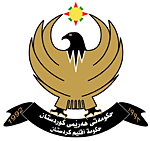

Kurdistan Regional
Government
Since 1992, the Kurdistan Regional Government (KRG) has been based in Arbil
(Kurdish: HewlÍr). The KRG has a parliament, elected by popular vote, called the
Iraqi Kurdistan National Assembly, and a cabinet composed of the KDP, the PUK
and their allies (Iraqi Communist Party, the Socialist Party of Kurdistan etc.).
Nechervan Idris Barzani has been prime minister of the KRG since 1999.
Secretary of Defense Donald H. Rumsfeld meets with Massoud Barzani in Iraqi
Kurdistan, on April 12, 2005. Source
The main Kurdish parties and peshmerga cooperated with the US-led coalition
during the 2003 invasion of Iraq that led to Hussein's overthrow. Kurdish
politicians were represented in the Iraqi governing council. On January 30, 2005
three elections were held in the region: 1) for Transitional National Assembly
of Iraq 2) for Iraqi Kurdistan National Assembly and 3) for provincial councils.
The Law of Administration for the State of Iraq for the Transitional Period
recognized the autonomy of the Kurdistan Regional Government during the interim
between "full sovereignty" and the adoption of a permanent constitution.
The Kurdistan Regional Government currently has constitutionally recognised
authority over the provinces of Arbil, Dohuk, and Suleimaniya, as well as de
facto authority over parts of Diyala and Ninawa and Kirkuk (at-Ta'mim)
provinces.
One particularly difficult issue yet to be resolved is the future boundaries of
the region. Many Kurds wish it to be expanded to include the largely Kurdish
cities of Mosul and Kirkuk, but this is complicated by the Assyrian, Turkmen and
Arab populations of both cities and the opposition of Turkey, which is concerned
about the region's potential to break away from Iraq (with possible consequences
for its own Kurdish minority). The final boundaries of the autonomous region are
set to be decided through a number of referendums before the end of 2007; the
referendum on Kirkuk will be held on 15 November 2007.
In the wake of the ratification of the Iraqi constitution in October 2005, Iraqi
Kurdistan reconstitutes itself as a Region under the new constitutional
framework. Kirkuk's status with respect to the Region should, under that
framework, be decided by a simple majority vote in the province.
The Kurdistan regional Government has inaugurated a movement to distinguish
itself from the rest of Iraq, entitled "Kurdistan - The Other Iraq", which has
some seccessionist leanings.
Structure of the KRG
The Kurdistan Regional Government (KRG) exercises executive power according to
the Kurdistan Regionís laws as enacted by the democratically elected Kurdistan
National Assembly (KNA).
The current government, led by Prime Minister Nechirvan Barzani, assumed office
on 7 May 2006.
The government coalition consists of several political parties. The coalition
reflects the diversity of the Regionís people, who are Chaldeans, Assyrians,
Turkmen, Yazidis, Kurds and others living together in harmony and tolerance.
The parties in the coalition government are the Kurdistan Democratic Party (KDP),
Patriotic Union of Kurdistan (PUK), Kurdistan Toilers Party, Kurdistan Socialist
Democratic Party, Kurdistan Islamic Union, Kurdistan Communist Party, the
Islamic Group and the Turkman Brotherhood Party. Among the cabinet members are a
Chaldean, an Assyrian, a Yezidi, a Faili (Shia Kurd) and an independent Turkoman.
Until the unification agreement of 21 January 2006, the governorate of
Suleimaniah was governed by a PUK-led administration, while the governorates of
Erbil and Dohuk were governed by a KDP-led administration.
In line with the wishes of the people and their own desire for a more efficient
and united government, the political parties of the Region signed the historic.
The broad-based coalition government is made up of 27 ministries and nine
ministers without portfolio.
The government is based in Erbil, the capital of the Kurdistan Region. It
administers the governorates of Erbil, Suleimaniah and Dohuk.